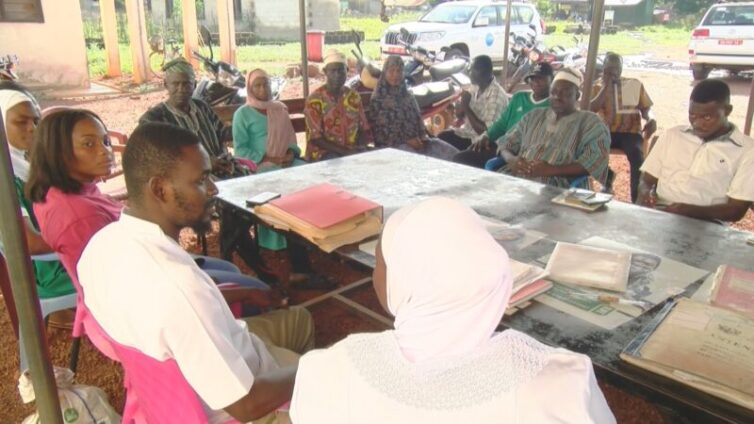Community engagement in healthcare is significantly improving maternal and child health, as well as addressing adolescent sexual and reproductive health needs in northern Ghana.
Programmes like Mother-to-Mother Support Groups, Community Health Management Committees, and Safety Nets for Adolescents are bridging gaps between communities and health facilities.
These initiatives are providing critical education on issues such as child malnutrition, exclusive breastfeeding, family planning, and personal hygiene. The result is a marked reduction in teenage pregnancies and better maternal and child health outcomes in communities.
In Yariga No. 2, Pusiga District, Upper East Region, women gather weekly for traditional dances and discussions on maternal health.

These gatherings provide a space for peer support, with songs promoting messages like the importance of exclusive breastfeeding. Dramatizing health education helps the group better absorb information.
Dr. Zakari Adams, Pusiga District Health Director, explains that community involvement was crucial after the Ghana Health Service noticed alarming indicators in maternal and child health.
"We were seeing high child mortality rates, low antenatal attendance, and poor delivery practices," he told JoyNews.

"Through our partnership with UNICEF, we realized that involving the community would significantly improve health outcomes."
Among the participants, women like Mamata and Barikisu have experienced personal transformations. Mamata shared how learning proper hygiene has improved her health and family relationships, while Barikisu acknowledged the group's role in ending harmful practices like female genital mutilation.

In Tamale's Nyanshegu community, a Community Health Management Committee has facilitated the construction of a meeting space and improved antenatal care attendance.
Their regular health awareness programs, supported by UNICEF, have contributed to reductions in anemia and other pregnancy-related conditions.

Porbilla Ofusu-Appiah, a nutrition specialist with UNICEF's Northern Region office, highlighted the far-reaching impact of community-driven healthcare interventions.
She emphasized the need for continued support and sustainability.

Adolescent girls, particularly in Pisigu, have benefited from Safety Nets and Adolescent Health Corners.
These interventions are helping curb teenage pregnancy rates and keeping girls in school. Rita Akaba, the Health Officer in Charge of Pishigu Health Centre, confirmed that these services are offering girls emotional and reproductive health support.

For example, 18-year-old Maimunatu, who became a mother while still in school, has returned to pursue her education, thanks to the support of the Safety Net program.
Similarly, 16-year-old Latifa, a young mother, is determined to finish school and become a nurse to help others in her situation.
However, sustaining these gains depends on the ability of the Ghana Health Service to continue funding these initiatives after UNICEF and its partners phase out.
Transportation and nutritional supplements remain significant challenges for the districts benefiting from these interventions.
These community-driven efforts offer hope for better maternal and child health outcomes in Ghana, but continued investment and support will be critical to ensuring their long-term success.
Latest Stories
-
Nzema East Blue Water Guards partner Axim police to foil galamsey operations around Draw River Forest Reserve
4 minutes -
Minerals Commission orders Heath Goldfields to cease operations at Bogoso-Prestea Mine amidst possible license revocation
9 minutes -
Ghana Music Awards Europe adds ‘Best Political Song’ category to 2025 edition
1 hour -
Azumah Resources refutes claims of selling Black Volta Gold Project
2 hours -
GFA boss Kurt Okraku appointed President of CAF Inter-Club Competitions
2 hours -
More HIV patients not on treatment – New report reveals
3 hours -
NSMQ 2025: A deep dive into Bono, Bono East and Ahafo schools eyeing national glory
4 hours -
Ibrahim Mahama donates GH¢50k to Suzzy Pinamang after funding life-saving eye surgery in UK
4 hours -
NSMQ 2025: Obiri Yeboah SHTS secures 3rd spot in Central Regional qualifiers
5 hours -
NDC Canada chapter applauds Gyakye Quayson’s appointment as deputy Minister for Foreign Affairs
5 hours -
Marie Kore International Tournament set to ignite Rugby fever in Abidjan
5 hours -
Ayisi treats fans to intimate performance in Accra following TGMA win
5 hours -
11 inmates of Manhyia Local Prison trained in batik, tie and dye craftsmanship
6 hours -
President of Rugby Africa Herbert Mensah arrives in Uganda ahead of the RAC2025
6 hours -
Inlaks wins Banking Technology Provider of the Year; Yacoba Amuah wins Outstanding Woman in Tech at DIA Awards
6 hours

